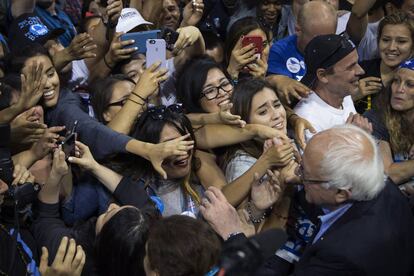Prolonged primary race creates divisions in Democratic Party
The Sanders campaign accuses National Democratic Committee chairwoman Schultz of bias after Nevada incident
Bernie Sanders supporters and the rest of the Democratic Party are engaged in an escalating dispute after a violent incident broke out at the Nevada Democratic Convention over the weekend. After condemning the violence, both sides accused each other of playing dirty. The scuffle has only increased the frustration some party members feel over Sanders’ refusal to drop out of the race even though it is nearly impossible for him to overtake Hillary Clinton. A prolonged primary season and this schism may hurt the party as whole when they face Republican presumptive nominee Donald Trump in November.

The Vermont senator’s supporters caused an altercation at the Nevada convention where the party was allocating delegates for each county within the state. They claimed there were irregularities during the process, something they say is symptomatic of the larger inefficient political system. Some attendees threw chairs and threatened the event’s coordinator. Sanders fans also broke up a Trump town hall meeting in March.
The senator has condemned the violence but says he shares the indignation of the protestors. “It is imperative that all state parties treat our campaign supporters with fairness... Unfortunately, that was not the case at the Nevada convention. At that convention the Democratic leadership used its power to prevent a fair and transparent process from taking place.”
Some attendees threw chairs and threatened the event’s coordinator. Sanders fans also broke up a Trump town hall meeting in March
Sanders campaign manager Jeff Weaver went a step further and blamed the the party’s national leadership. He accused National Democratic Committee Chairwoman Debbie Wasserman Schultz of “working against” the senator and dividing the party. “There’s no doubt about it, for personal reasons,” Weaver added.
The day before, Schultz, Harry Reid, the Democratic Senate minority leader, and other high-ranking party officials, asked Sanders to condemn the incident and tell supporters to refrain from similar actions at the party’s July convention. Clinton supporters believe Sanders will drop out of the race before the conference.
The ghost of 1968
The goal is to avoid any altercations like those that took place at the Democratic Convention in 1968, when skirmishes broke out between police officers and anti-war groups who believed there were irregularities in the nomination process.
On Wednesday, the Barack Obama administration jumped into the fray. “The president on a number of occasions has spoken out against violence and has certainly said a political dispute like this can never be used to justify violence or a threat of violence,” Josh Earnest said at the White House daily press briefing.
Meanwhile, this schism among Democrats benefits Trump, who established himself as the Republican nominee two weeks ago after his last two rivals exited the contest. The multimillionaire businessman is now focused on attacking Clinton and courting Sanders voters, who like both men’s message against the free market and political elites.
Trump told his Twitter followers that Sanders was being treated “very badly” because the system is “rigged,” and he bragged that he and the Vermont senator have “many” fans in common.
Clinton, on the other hand, fears that some Sanders voters who lean further left than she does will defect to the Republican side in November or decide to not vote as a protest against the political establishment. Only 30 percent of Americans believe the nomination process is just. According to Vox, in 2008, 67% said they thought the system was fair.
English version by Dyane Jean François.
Subscribe to our newsletter
EL PAÍS English Edition has launched a weekly newsletter. Sign up today to receive a selection of our best stories in your inbox every Saturday morning. For full details about how to subscribe, click here.
Tu suscripción se está usando en otro dispositivo
¿Quieres añadir otro usuario a tu suscripción?
Si continúas leyendo en este dispositivo, no se podrá leer en el otro.
FlechaTu suscripción se está usando en otro dispositivo y solo puedes acceder a EL PAÍS desde un dispositivo a la vez.
Si quieres compartir tu cuenta, cambia tu suscripción a la modalidad Premium, así podrás añadir otro usuario. Cada uno accederá con su propia cuenta de email, lo que os permitirá personalizar vuestra experiencia en EL PAÍS.
¿Tienes una suscripción de empresa? Accede aquí para contratar más cuentas.
En el caso de no saber quién está usando tu cuenta, te recomendamos cambiar tu contraseña aquí.
Si decides continuar compartiendo tu cuenta, este mensaje se mostrará en tu dispositivo y en el de la otra persona que está usando tu cuenta de forma indefinida, afectando a tu experiencia de lectura. Puedes consultar aquí los términos y condiciones de la suscripción digital.








































